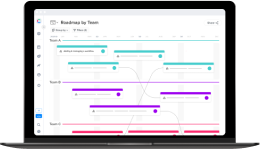Home > Blog > Cracking the mystery behind Product Operations – What is it, and what are the responsibilities?
Cracking the mystery behind Product Operations – What is it, and what are the responsibilities?

In recent years, the tech industry has seen the rise of a new role that has quickly become a vital component of many companies’ success: Product Operations. This role, which sits at the intersection of product management, engineering, and business operations, has had an increase in demand as companies have recognized the need for a more integrated approach to building and scaling products.
From ideation to launch and beyond, ProductOps professionals are responsible for ensuring that all aspects of the product management and development process are running smoothly. They work closely with cross-functional teams to drive alignment and collaboration, streamline processes, and improve product performance. With their unique blend of technical, strategic, and operational skills, they are able to bridge the gap between the various functions within a company and drive better outcomes for customers and the business.
In this blog post we will explore:
- The responsibilities the role holds.
- The rise of Product Operations in the tech industry and its increasing importance.
- The skills necessary for success.
- The various career paths and opportunities available.
- The difference between ProductOps and product management.
What is ProductOps?
Product Operations (ProductOps, for short) is a multifaceted role that plays a critical part in the success of tech companies. At its core, the role is responsible for ensuring that products are designed, built, and launched successfully, while also optimizing performance and driving customer satisfaction. This involves working closely with cross-functional teams, including product managers, engineers, data analysts, and business stakeholders, to identify and resolve issues, streamline processes, and drive innovation.
Ultimately, ProductOps are responsible for holding the rest of the team accountable for their outcomes.
ProductOps – Key Responsibilities
One of the key responsibilities of Product Operations is to drive collaboration and alignment across different functions within a company. This involves communicating effectively with team members and stakeholders, identifying potential roadblocks or conflicts, and finding ways to overcome them. By bringing together different perspectives and skillsets, Product Operations can help to ensure that products are designed and developed with a holistic approach that takes into account both technical and business considerations.
But that’s not all! As such a dynamic role, there are some key responsibilities to look after:
1) Communication and collaboration
Facilitating communication and collaboration between different teams within the organization is a key aspect of the role. This includes ensuring that information is shared effectively and reinforcing processes, policies, and practices across teams.
2) Resource management
Maintaining templates, guidelines, how-to guides, and other resources and documentation that are necessary for product development. They must ensure that these are up-to-date and accessible to all relevant team members.
3) Streamlining processes
Identifying opportunities to automate routine practices and streamline processes, unblocking valuable time for more critical tasks.
4) Continuous education
Responsibility for developing and maintaining a Continuous education program for product managers, ensuring that they have access to the latest product management best practices, tools, and are equipped to succeed in their roles.
5) Onboarding support
Responsible for supporting the onboarding process for new product team members, ensuring that they have the resources and information necessary.
6) Best practices research
Product Ops is responsible for researching and organizing information on product management best practices, ensuring that the product team is always up-to-date on the latest trends and innovations in the industry.
7) Tool management
The ProductOps team manages all tooling for the product team, including identifying, deploying and administration of them. This will enable the team to work with the best tools in the market, while also ensuring that these remain scalable as the organization continues to grow.
By taking care of these key responsibilities, the ProductOps team plays a key role in making sure that products are delivered quickly, within budget, and to the highest possible standard of quality. This ensures that customers are happy and business goals are met.
Why is ProductOps so important?
With the increasing complexity and competitiveness of the tech landscape, companies are realizing the critical need for effective coordination, communication, and collaboration between different teams within the organization – and as such, the role is able to meet those demands (especially for any product-led organization!)
ProductOps is uniquely positioned to help any company through growth and scalability. As growth happens, it can become increasingly challenging to manage the various teams and processes involved in product development. This is where Product Operations comes in, providing a critical function in ensuring that different teams are aligned and working towards common goals.
One of the key ways in which the role can help with scaling and growth is by streamlining processes and resources. By identifying areas of inefficiency or duplication, Product Ops can help to eliminate waste and improve the speed and efficiency of product development (We’re all familiar with the “what project management tool are we using again?” problem!). Not only do companies run the risk of duplicating tools and work, but also falling behind in innovation.
The growing importance of the role is reflected in the increasing number of companies that are investing in this function. Many of the world’s leading tech companies, including Facebook, Google, and Amazon, have dedicated teams that are responsible for overseeing critical aspects of the product development lifecycle.
ProductOps Skills
Like any other cross-functional role, being in ProductOps requires a unique set of skills and attributes to be successful. These may include:
1) Strong communication skills
One must be able to communicate effectively with various teams and stakeholders, including engineers, designers, product managers, and executives. This requires outstanding written and verbal communication skills, as well as the ability to convey complex information in a clear and concise way. As with any other product role, empathy is a key component of this!
2) Strategic thinking
Thinking strategically and understanding how different teams and processes fit together is crucial to achieve overall business goals. This requires the ability to think critically, identify opportunities for improvement, and develop strategies to optimize processes and resources.
3) Project management skills
Juggling multiple projects simultaneously and ensuring that they are completed on time and within budget. This requires excellent project management skills, including the ability to prioritize tasks, manage resources, and keep that communication going to unblock the product team.
4) Analytical skills
Analyze data and use insights to make informed decisions. This requires strong analytical skills, including the ability to collect, analyze, and interpret data, as well as the ability to identify trends and patterns.
5) Relationship building skills
Excellent interpersonal skills is a must for this role, as you’ll be working with various stakeholders from across the organization.
6) Adaptability
Adapt to change and thrive in a fast-paced, rapidly changing environment. This requires the ability to be flexible, embrace new challenges, and continually learn and grow. Let’s be honest, product is hard!
What is the Product Operations Career Path?
Like any other role, you’re probably wondering what kind of career path is available. ProductOps is a relatively new role in general, so don’t be surprised if there isn’t a “Chief Product Ops” role – but who knows, there might be one in the future!
Meanwhile, the path from specialist, to manager, to director and even VP does exist for the role. As with many other strategic product roles, as you grow into the role you’ll be leaning more into strategy and people management, ensuring the rest of your team is supported, heard, and ready to help others be successful.
ProductOps is also a really great role that can lead to other career paths, as many of the skills are transferable. These may include product management, customer success, data analyst, and entrepreneurship.
ProductOps vs Product Management – What’s the difference?
By now you may be thinking Product Ops and Product Management are both sounding quite similar. While there are some similarities, they are quite different in responsibility.
Product Operations is mostly concerned with making sure that the processes and infrastructure that help with product development are working smoothly. This includes overseeing communication and collaboration between cross-functional teams, streamlining workflows, managing resources, and ensuring that everyone involved in product development is working efficiently and effectively. Product Ops professionals are responsible for making sure that the product development process is well-organized, and that all team members have the tools and resources they need to do their jobs.
On the other hand, Product Management is focused on developing and executing the product strategy. Product Managers are responsible for identifying market opportunities, defining the product vision and strategy, and defining the product roadmap. They work closely with cross-functional teams to ensure that the product is developed in a way that meets the needs of the market and the business.

While both roles require strong communication skills and the ability to work with cross-functional teams, Product Operations tends to be more focused on the operational side of product development, while Product Management is more focused on the strategic side. That said, there is often overlap between the two roles, and some professionals may work in both roles at different points in their careers. Ultimately, the distinction between the two roles will depend on the specific needs of the company and the product development process.
Conclusion
Product Operations is a critical role that has become increasingly important in the tech industry, as companies recognize the need for a more integrated approach to building and scaling products. With their unique blend of technical, strategic, and operational skills, ProductOps professionals are responsible for ensuring that all aspects of the product development process are running smoothly. While there are some overlapping skills and potential responsibilities with other product roles, such as that of the product manager, they remain quite different. While product management focuses on building products, ProductOps unblocks and sets a path for success for product managers, ensuring nothing is on their way to building amazing products.


